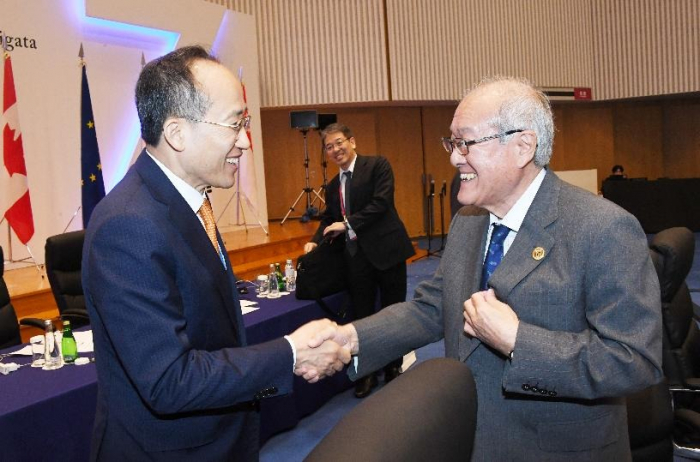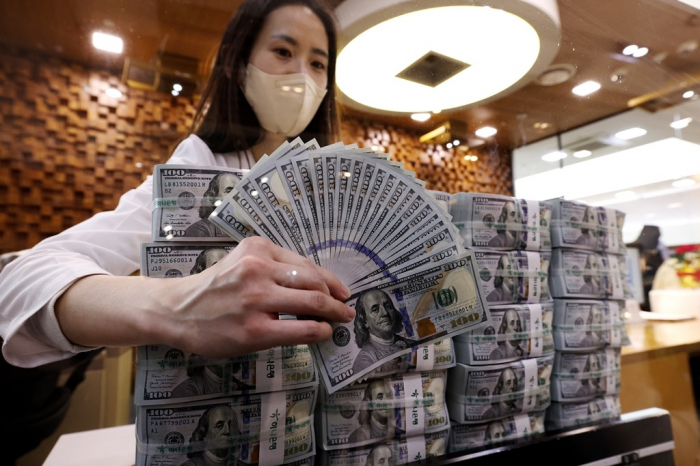Foreign exchange
S.Korea, Japan to resume bilateral currency swap for dollars
Japan is poised to provide only US dollars, not yen, while South Korea will supply liquidity in dollars and won
By Jun 28, 2023 (Gmt+09:00)
3
Min read
Most Read
LG Chem to sell water filter business to Glenwood PE for $692 million


KT&G eyes overseas M&A after rejecting activist fund's offer


Kyobo Life poised to buy Japan’s SBI Group-owned savings bank


StockX in merger talks with Naver’s online reseller Kream


Meritz backs half of ex-manager’s $210 mn hedge fund



South Korea and Japan are set to revive their bilateral currency swap line to bolster their dollar liquidity this week after an eight-year suspension, given the improving diplomatic relation between the two countries, government sources in Seoul said on Wednesday.
Japan is poised to provide only dollars, not yen in the expected arrangement, while South Korea will supply liquidity in the US currency and the won, according to the sources. In past swap lines, Tokyo provided liquidity in both the dollar and the yen.
“The Korea-Japan currency swap will be revived based on the dollar,” a senior South Korean government official told The Korea Economic Daily. The size of the line was known to be $2 billion-$10 billion.
Seoul’s Finance Minister Choo Kyung-ho and his Japanese counterpart Shunichi Suzuki are scheduled to meet in Tokyo on Thursday to discuss the current economic situation, as well as economic and financial cooperation.
The Nikkei reported that they seek to finalize a renewed currency swap deal during the meeting.
DOLLAR LIQUIDITY
South Korea is predicted to secure additional dollar liquidity from the expected agreement to deal with a potential crisis as the country’s currency swap contract with the US expired at the end of 2021.
A currency swap is a tool meant to defend against financial turmoil by allowing a country facing a liquidity crunch to borrow money from others with its own currency.
“South Korea is likely to benefit more from the revived swap deal as it will supply dollar liquidity in an emergency to the country of a local currency,” said Kim SeungHyun, a senior researcher at the Korea Institute for International Economic Policy. “It will reduce currency risk, escalated by events like the Russia-Ukraine war and interest rate hikes in developed countries such as the US.”
The South Korean won has lost 3.3% against the dollar so far this year after depreciating 6% in 2022.

Tokyo may prefer a swap deal, in which the country is set to provide dollars instead of yen, as the country pledged to take action to support the ailing Japanese currency. The unit stayed around its lowest level since November last year versus the US currency while hitting an eight-year trough against the won.
Japan's top currency diplomat Masato Kanda warned against the yen's ongoing weakness on Wednesday, vowing to take an appropriate response if moves become excessive.
The country and South Korea are likely to take advantage of the revived swap agreement, Yang Joon Mo, an economics professor at Yonsei University in Seoul said.
“The measure is a win-win deal since it will help both countries stabilize their currencies,” said Yang.
SIZE DOES NOT MATTER
South Korea, however, does not need to seek a large-scale currency swap line as Seoul has enough foreign exchange reserves, said the country’s officials. The arrangement is just symbolic, showing their thaw in diplomatic relations, they added.
Its foreign exchange reserves totaled $421 billion as of end-May, according to central bank data earlier this month. The reserves were the world’s ninth-largest at the end of April when they stood at $426.7 billion.
Korea and Japan signed their first currency swap pact of $2 billion in 2001. The arrangement grew to $3 billion in 2005, $8 billion in 2006 and $57 billion in 2011. Its balance had risen to up to $70 billion.
But the swap line has been shrinking since former South Korean President Lee Myung-bak visited Dokdo, a group of islets in the East Sea under territorial dispute between the two countries, in August 2012. The arrangement expired in February 2015.
Talks over a new swap accord were suspended in January 2017 when their relations soured on historical and territorial issues including those over South Korean victims of forced labor during Japan’s colonial rule of the Korean Peninsula from 1910 to 1945.
Their relations, however, improved after the current South Korean President Yoon Suk Yeol in March offered to resolve the forced labor issue by compensating Korea's own without asking for contributions from Japan.
Write to Se-Min Huh at semin@hankyung.com
Jongwoo Cheon edited this article.
More to Read
-
 Foreign exchangeS.Korea to discuss bilateral currency swap with Japan
Foreign exchangeS.Korea to discuss bilateral currency swap with JapanJun 09, 2023 (Gmt+09:00)
2 Min read -
 Foreign exchangeYen breaches key level vs Korean won to hit 8-year low
Foreign exchangeYen breaches key level vs Korean won to hit 8-year lowJun 19, 2023 (Gmt+09:00)
1 Min read -

-
 The KED ViewKorean won needs economic fundamentals recovery for rebound
The KED ViewKorean won needs economic fundamentals recovery for reboundMay 16, 2023 (Gmt+09:00)
3 Min read
Comment 0
LOG IN


